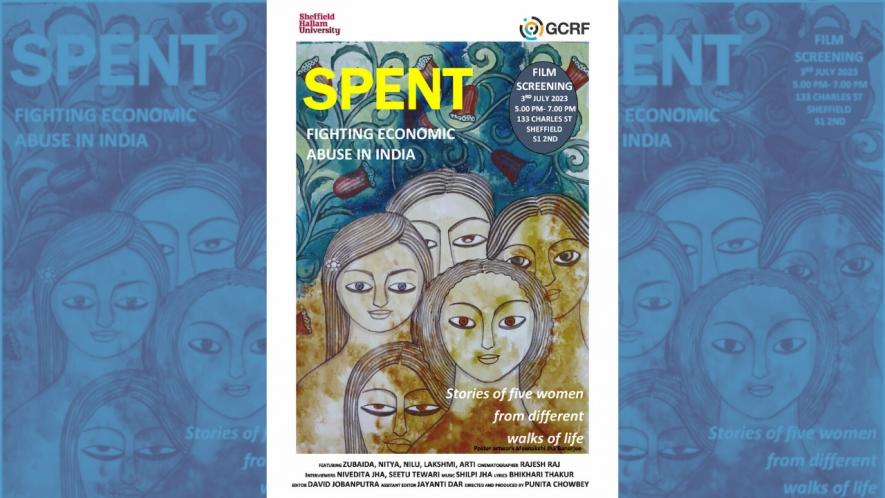New Film Highlights Economic Abuse of Women

Image courtesy: Sheffield Hallam University
Twenty-nine-year-old Lakshmi [name changed], born and raised in a lower middle class family, moved to her husband’s home after marriage. Conditioned to build “trust” with her in-laws, Lakshmi believed in the worthiness of her husband. But not long after, she learned that her husband had been impersonating her on WhatsApp, and sending emails to seniors at her workplace. When Lakshmi told him not to talk to anyone on her behalf—particularly not at her workplace—he asserted his “right” to do so as her husband. Cleverly, Lakshmi’s husband took from her the passwords of her bank accounts, thereby gaining control over her earnings.
As the days rolled into weeks, and weeks into years, the man perpetrated violence on Lakshmi. She could get relief neither from her parents nor the police. Suffering abuse at the hands of her husband has become a fait accompli. Heartbroken, she battles to emerge from the vortex of the abusive relationship she is caught in.
Lakshmi’s heart-wrenching travels feature in the film ‘Spent’ funded by the Global Challenges Research Fund (GCRF) and Sheffield Hallam University (UK) and is part of Impact Covid-19 Women’s Employment Project in Bihar. Dr Punita Chowbey, the principal investigator and senior research fellow at the Sheffield Hallam University screened the film for a select audience of feminists, activists, researchers, public intellectuals and journalists at the Jagjivan Ram Institute of Parliamentary Studies and Political Research, Patna on December 15.
The documentary is a novel experiment in exploring the economic abuse of women in India and is based on first-hand accounts of five women of 75 interviewed and discussed as part of the project. The women are from Hindu and Muslim communities across castes, classes and occupations in Bihar. Activist and independent consultant Nivedita Jha, and independent journalist Seetu Tiwary have assisted Chowbey in making the film.
Generally, patriarchy in India is seen in the light of women’s conditioning to suit the stereotypes of family, social, cultural and religious values. “Exploring the economic aspects of domestic violence is a new area of study. Universities and research institutions across the world have very recently embarked on exploring the economic angle of patriarchy.
‘Spent’ is a novel film focusing on the exploitation of women on account of their [lack of] control over economic means,” Chowbey told this writer.
Her film reflects three kinds of abuse women face, all of which deal with control over economic means. Apart from Lakshmi, whose financial independence was sabotaged by her husband, it reflects the exploitation of resources and restrictions limiting women’s access to economic resources.
Vandana, who got no formal education and is self-employed, explains how she was exploited during her marriage. “He (the husband) will take out a loan for no reason and it falls on me to pay it back. We get into arguments, but it makes no difference to his profligacy. Irrespective that he does not earn, he will buy and wear expensive shoes and clothes,” she says in the film about her perennial exploitation.
The account of 29-year-old post-graduate homemaker, Nitya, exposes the ‘restrictions’ that were imposed on her which limited her access to basic economic resources. Her husband never gave money to her. Instead, he would demand money from her to buy necessities as well as ‘extras’. Once, he threw a party and made Nitya pay for it. Bit by bit, he took her jewellery, restricted her from using public transport and finally prevented her from going out of the house.
The shared woes that emerged from the depictions of situations in ‘Spent’ also showed that the police were of no use in such cases. “Police ke paas jaaney se koi faida nahin (Reaching out to the police is of no help)”, a survivor says in the film. Moreover, women find it hard to fall back on their parents, too.
“The bringing up and conditioning of women in their families may maintain a façade of modernity but families are mired in deep-rooted patriarchal obscurantism. They are, in a way, largely responsible for exposing women to economic exploitation,” says Nivedita. She adds, “Women are instilled with ‘archetypal’ values to ‘adjust’ to the husband and in-laws even if the latter are exploitative.”
The film had a sombre effect on the audience. Once the screening was over, a pall of silence enveloped the hall. “Better to screen the film before parents to ensure they become more caring about their daughters. It should be shown to the authorities concerned as well, who can make appropriate laws and train the police to deal with such issues,” an audience member demanded. There were requests for Chowbey and Jha to screen the film at district headquarters.
Though a low-budget film, ‘Spent’ carries a profound message for women’s empowerment. With dialogues in Hindi and subtitles in English, it can reach a wide audience, including in universities and research institutions. Hopefully, it’s messages will hit home.
The author is a senior journalist, media educator, and researcher in folklore. The views are personal.
Get the latest reports & analysis with people's perspective on Protests, movements & deep analytical videos, discussions of the current affairs in your Telegram app. Subscribe to NewsClick's Telegram channel & get Real-Time updates on stories, as they get published on our website.
























